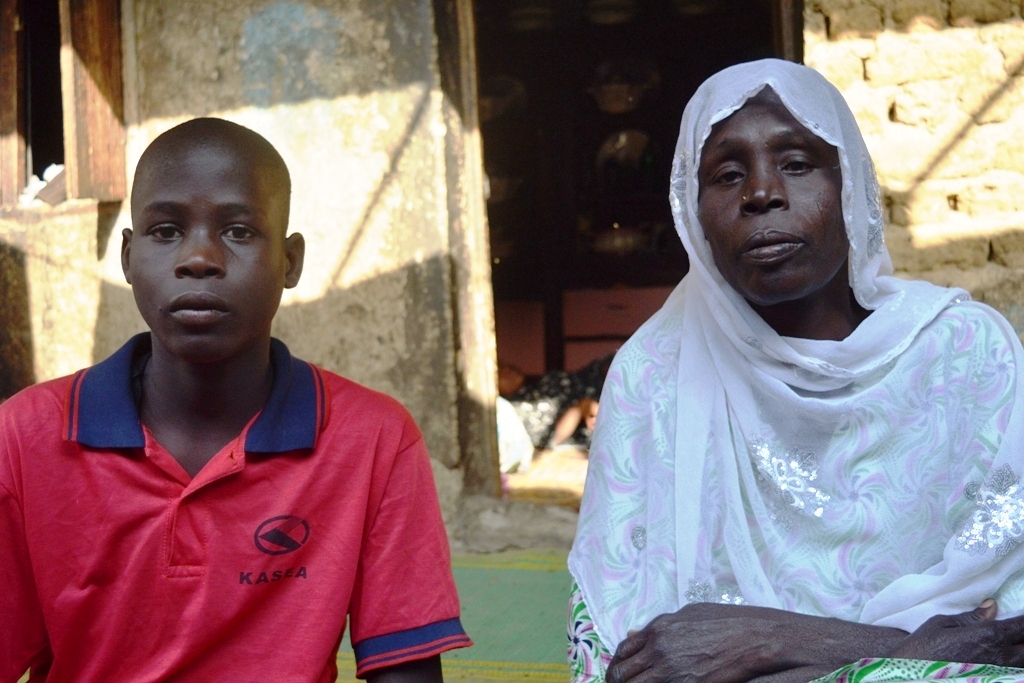Kieran Guilbert/Reuters
By
Kieran Guilbert
Running his fingers over the wide scars on his knee and thigh, 13-year-old Usman recalled the moment he thought he would die.
The boy was fleeing a Boko Haram attack on his village in northeast Nigeria with his mother last year when two militants knocked him to the ground, and approached him wielding knives.
“I was scared that I would die … that I would never see my mother again,” said Usman, explaining how he limped to a nearby camp for the displaced in Bama town in Borno state, the heart of the jihadists’ brutal seven-year bid to create an Islamic state.
For two months, Usman heard nothing about his mother, Fatima, until two aid workers brought good news. They had tracked her down to her brother’s house in the nearby city of Maiduguri.
“We cried when we saw each other, there was so much joy,” he told the Thomson Reuters Foundation, sitting next to his beaming mother, Biba, in the cramped, dusty yard of his uncle’s home.
More than 30,000 children like Usman have lost or been separated from their parents during an insurgency which has left nearly two million people uprooted after fleeing Boko Haram.
While two-thirds of these children are being cared for by a relative, the remainder – around 10,000 – are forced to fend for themselves, according to the U.N. children’s agency (UNICEF).
With many of them relying on the help of local communities or displaced families to survive, aid workers are striving to reunite these solitary children with their parents.
But tracing and tracking down relatives can take several months – leaving them prey to child marriage, sexual abuse and forced labour in the meantime, aid agencies say.
“Children may even resort to begging, hawking and transactional sex to survive,” said Rachel Harvey, chief of child protection for UNICEF.
TRACING AND TRACKING
When children arrive in a camp or community without their parents, or alone, they are quickly referred to local aid groups which carry out family tracing and reunification programmes.
Aid workers and volunteers take down as many details as possible from the children and share the information with their colleagues across northeast Nigeria, who go from camp to camp, community to community, reading out names and following leads.
But with three-quarters of the 1.8 million people displaced by Boko Haram living in communities across six states, rather than in camps, the work can be arduous and time-consuming, said Myriem El Khatib of the International Committee of the Red Cross (ICRC).
“It is much easier to trace relatives living in IDP (internally displaced persons) camps as people tend to gather together based on the village they fled from,” said El Khatib, co-ordinator of the ICRC’s Restoring Family Links programme.
“Outside of the camps, the displacement pattern is more random, and there are many areas which we still cannot access due to the insurgency. The average process takes many months.”
Even when parents or relatives are tracked down and told about their children, reuniting them is not always simple.
The makeshift foster families and caregivers who look after unaccompanied children may refuse to let them go, according to the Centre for Community Health and Development (CHAD).
Some people send the children to work or attempt to marry them off for money, while others hope having another child under their care will result in more humanitarian aid, said Shadrach Adawara, family tracing and reunification officer for CHAD.
“In one case, an uncle refused to release his brother’s children, because he wanted to marry the eldest daughter off.”
“Thankfully, a call between them resolved the issue, and the children returned to their father,” said Adawara, adding that aid workers regularly check up on reunited children, and refer them to services from healthcare to psychosocial support.
‘TEARS OF HAPPINESS’
In some cases, children may decide not to go back to their parents or relatives, several tracing officers said.
They may have suffered abuse or had been forced to work by their parents, or decide to spare their struggling families the added burden.
When 17-year-old Fatima, a former Boko Haram captive who escaped after two years while heavily pregnant, was reunited with her mother, they could not stop crying and hugging – having presumed each dead for so long.
But Fatima soon realised she and her baby could not stay with her mother and younger siblings in her hometown of Monguno.
“I saw the poverty, and many responsibilities of my mother … and decided it would be better for me and my baby boy to live with my older brother in this (Bakassi) IDP camp,” Fatima said, cradling and rocking her two-year-old to sleep.
While Fatima is relieved to be with her brother, she is one of the lucky few. Only some 400 children – out of 32,000 living alone or without a parent – have been reunited with their families so far, according to figures from UNICEF.
“It can be very frustrating because it can take so long,” said El Khatib of the ICRC. “But it is worth it when you see the emotion from the families … whether it is tears of happiness or just a pat on the arm and saying: ‘Nice to have you home’.”
Back at her brother’s house in Maiduguri, Biba fusses over 13-year-old Usman – much to his embarrassment – as she recalls the day they were reunited after two long months.
“I could not stop smiling,” she said. “Everybody in the neighbourhood saw my face, and knew he was finally back.”



No Comments Yet!
You can be first to comment this post!